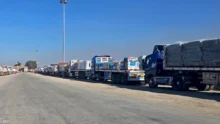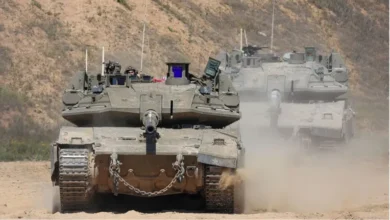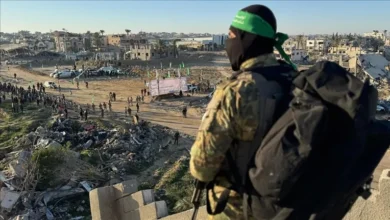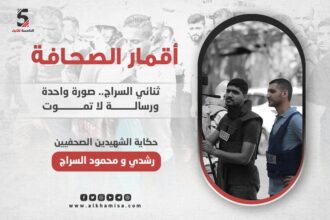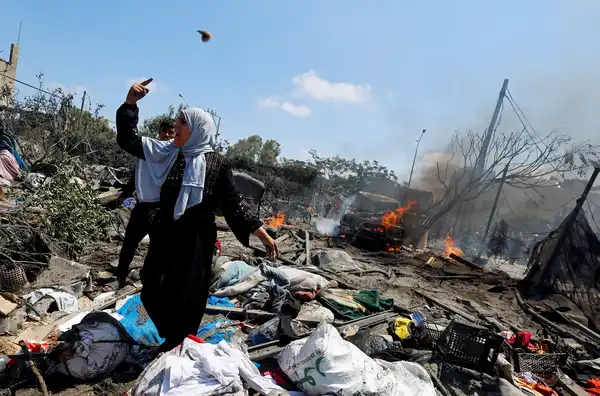Where Do We Go? Renewed Displacement in a Homeland That Has No Room for Its Own People
شبكة الخامسة للأنباء - غزة
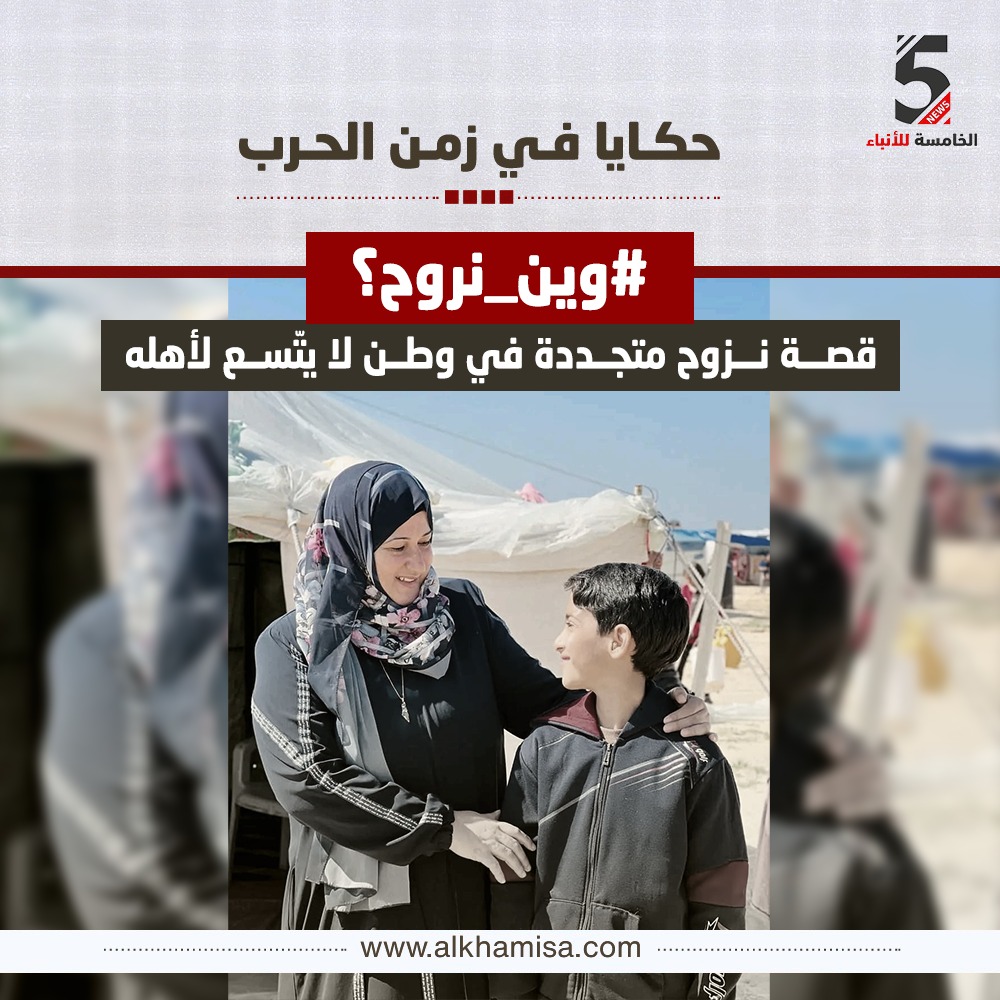
Where Do We Go?.. Tales in Wartime Produced by: Sahar Dahliz
To writers and readers…
Do not take the headlines and leave the details.
Write everything… name the people, the faces, the places and the suppressed cries. History is not written from above, but from the depths of the rubble.
Hukmat Al-Masri, recounting her bitter displacement, said: “I returned to the same place I first fled to, in mid-October 2023. On the same bed I threw my exhausted body after a long journey, weighed down by scenes that wore out my sight and my heart, from Gaza city to the Nuseirat camp, where my sister Heba’s home is.”
She added: “The decision was for the family to split in different directions, in hopes each of us would find a roof to shelter under. No clear destination, no tents to make temporary homes with after we lost our house in Beit Lahia, and nothing left to our name.”
“Where do we go?” was not a casual question but a cry that split hearts, minds and bodies.
The cry of elders leaning on canes of exhaustion, of women dragging their children through the rubble, and of children sleeping on cold stones that know no mercy.
In Gaza, the land is shrinking around its people and the sky rains fire, not relief.
In Gaza, we are not asked to live… only to survive.
But even survival has become impossible and hearts can only lift their question to the sky: Where do we go?
The Road to Nuseirat
She continued: “I decided to go to Nuseirat with my son Aboud. I chose evening, hoping it would be less dangerous.
I took as many clothes and a few belongings as I could and headed toward the Saraya area.
And there… the scene was more than could be borne.
A square packed with thousands: vendors, beggars, displaced people, the exhausted sleeping on the ground, everyone waiting for a car or an animal-drawn cart to take them to their destinations.”
For a moment she remembered the crowds in India, China, Egypt and Afghanistan… but here the crowd screamed hunger, homelessness and fear.
My son Aboud ran from car to car trying to find us a place, to no avail. We waited more than two hours, then I sat on the curb exhausted.
Aboud came close and whispered: “Mama… will you write about this?”
I lowered my gaze; I felt the fatigue heavier than the act of writing.
The Hungry Woman
Al-Masri pointed to a woman sitting beside her with a large black bag next to her. She spoke to her; the woman had been waiting three hours, she had come from Maghazi camp in the morning to collect a food parcel. She has three daughters, her husband died, and she was displaced from Jabalia camp to Maghazi.
While she was speaking, she stopped a bread vendor, bought an empty loaf and began devouring it quickly, saying: “I haven’t eaten since yesterday.”
I looked at her in astonishment; I said nothing, I had nothing to say.
The Journey Begins
She added: “As night fell I thought of returning to my temporary displacement spot, despairing of finding a ride. But Aboud noticed a blue ‘Volks’ car whose driver was calling out: ‘Al-Nuwairi! Al-Nuwairi!’
We hurried to it, sat in the back seat, and the driver told us: ‘The fare is twenty shekels, that’s about $7, if you don’t like it get off.’” (It was less than one dollar before the war)
The car filled with passengers and their belongings; bodies pressed together and breaths short, as if we all carried a burdened life on our backs.
Farewell to Gaza
The car moved slowly through the crowd. I looked out the window: Omar Al-Mukhtar Street, clothing shops, Al-Sousi restaurant, Kazem ice cream, Al-Sultana Café, the ruined Legislative Council building, the rubble of the Rashad Al-Shawa Cultural Center, the university district turned into shelters for the displaced, the towering buildings threatened with collapse.
I wondered: How will this beauty turn into death in such a short time?
Beit Lahia has turned from a paradise on earth into an occupied hell?!
My tears fell without permission; I felt a lump in my throat: perhaps this is the last time I will see Gaza.
Everything was heading south: cars, trucks, tuk-tuks, carts loaded with furniture, bedding and household items.
The sky full of aircraft, the ground overflowing with displaced people, and on the beach women and men spread on the sand holding scraps of clothing and pieces of bread.
It all resembled the Day of Judgment… but without a promise of deliverance.
Arriving in Nuseirat
A desolate night, the bombing chasing even memory, and the sky lit not by stars but by missiles of death.
She continued: “The phone rang, it was Heba… her voice trembling, asking every minute: ‘Where are you? Is the road safe?’
I reassured her, but my heart was not reassured.”
She added: I went back in my memory to recent days…
I used to drive from Beit Lahia to Nuseirat with confidence; the roads were safe and life buzzed on every corner… we lived without counting our steps or fearing tomorrow.
After long hours of worry and fatigue, arrival was not just an ‘arrival’ but a temporary salvation.
At Al-Nuwairi hill we got out of the car and took another that brought us to the heart of Nuseirat.
In the streets… exhausted faces and eyes searching for a scrap of bread, a shelter, or news of safety.
The Embrace
About the moment they reached her sister Heba’s home, which she described as a lifeline, she said: “She opened the door quickly, tears before words, I threw myself into her arms as if reclaiming a piece of lost safety, and I hugged her daughters Lujain, Jouri and Kenzi. They clustered around me like wings of peace trying to protect my heart from collapse and hide me from the cruelty of the world.”
As for Aboud, his small face lit up with the joy of arriving safely, but he did not last long before exhaustion; he stretched on the floor and sleep overcame him without warning, as if his body declared surrender after the ordeal and fear, whispering: “Enough.”
This Is Gaza
One journey encapsulates the pain of a nation, one house becomes a refuge for an entire family, and a single embrace restores a bit of life.
Write Everything
This is not just the story of a family that survived, but a living testimony to the memory of an entire people being displaced, killed and resisting… not merely a journey of displacement but a chapter in Gaza’s sorrowful history.
Do not allow the details to be forgotten.
Here… history is born from among the rubble.

